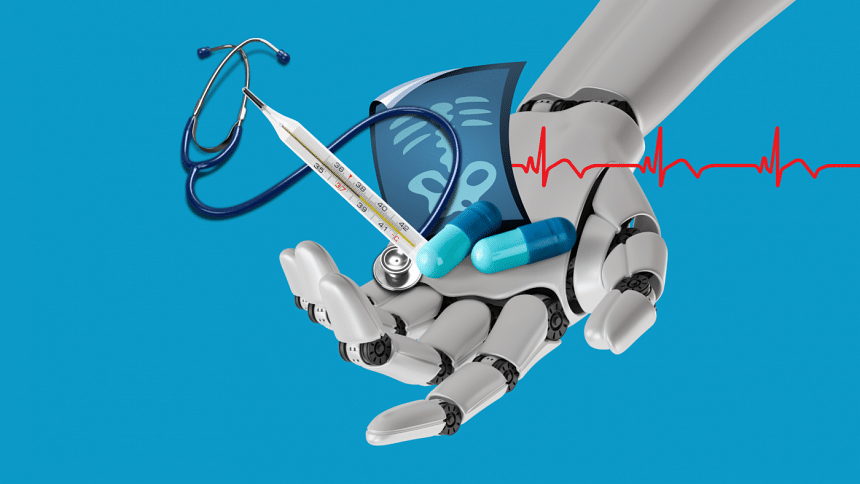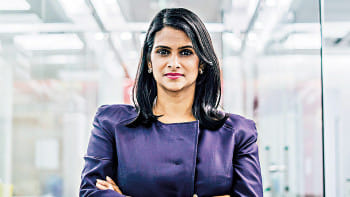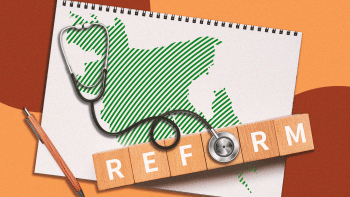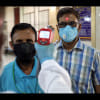We must utilise artificial intelligence to transform healthcare

Artificial intelligence (AI) can be utilised in almost all aspects of healthcare, from diagnosis and treatment to streamlining daily administrative work. The US is at the forefront of exploring the potential of AI in healthcare, and Cleveland, Houston, and Boston are the major cities where new AI-driven technologies are being designed and tested. Other countries like China, the UK, Israel, South Korea, Japan, and Germany are also heavily investing in AI tools and applications. In Bangladesh, we must take a proactive approach to adopting AI tools to improve efficiency in our healthcare.
AI can take a prominent role in operating rooms. In surgical procedures, like knee and hip surgeries, AI-operated robots can perform minimally invasive operations that reduce recovery times, minimise scarring, and lead to overall better health outcomes. Globally, California-based Intuitive Surgical's AI-powered robot da Vinci Surgical System, operating in about 70 countries, has performed 10 million procedures since its release in 2000. The system combines advanced robotics, high-definition 3D visualisation, and equipment that mimics the movement of a surgeon's hand but with greater precision and accuracy. Indeed, robotic surgery has already become a major global market, with a projected growth of $83 billion by 2032.
AI has also shown remarkable capabilities in diagnosis and personalised treatment. AI technologies now analyse radiological images with accuracy levels that rival or exceed human limits. While it might take a radiologist minutes or longer to analyse a single scan, an AI tool takes only seconds to review hundreds of scans more accurately! AI mechanisms can also discover small fractures and anomalies in medical images that human experts may miss. It can identify conditions like breast cancer and lung diseases more precisely than clinicians. Analysing genetic information, lifestyle factors, and environmental data, AI tools can recommend personalised medication. This precision medicine approach is vital in oncology where tailored treatment is often recommended based on the patient's genetic profile.
Beyond surgeries and cancer detection, AI algorithms can also provide predictive analysis based on patients' lifestyle, environmental, and behavioural data. For example, an AI algorithm can track a patient's exposure to pollutants, and changes in vital signs, and predict the likelihood of developing conditions like asthma and heart disease. The algorithms can detect early signs of neurological disorders, diabetes, and heart failure, allowing early intervention to prevent illness, emergency department visits, and readmissions.
AI is also widely used in remote monitoring, telemedicine, and virtual assistance around the clock. Almost all wearable devices, such as smartwatches, fitness trackers, smart glasses, wearable electrocardiogram (ECG) monitors, bio-stickers, and smart rings, have built-in AI applications. These tools can perform vital tasks such as tracking patient heart rates, sleep patterns, respiratory rate, activity and stress levels, and send data to providers in real-time. This ease of data collection helps manage chronic diseases and ensure timely response to emergencies. AI-run virtual assistance programmes are often equipped with 24/7 patient counselling, medication reminders, and follow-up check-ins.
Even though AI-powered devices can revolutionise healthcare, there are significant challenges in implementing its solutions. A major barrier is the integration and interoperability of AI tools into the existing capabilities, infrastructure, and electronic health records (EHR) systems. Currently, Bangladesh is taking only the first steps towards digitising healthcare by incorporating some web-based and mobile applications to make appointments, doctor visits, deliver drugs, and process transactions. Of course, challenges with interoperability can be overcome by training physicians on the usage of AI tools, as well as market-driven competition by technology vendors. Effective use of AI requires that clinicians understand how to interpret AI outputs and integrate them into decision-making processes. Bridging the knowledge gap is an important first step to implementing AI technologies.
High-quality data is another critical element for driving AI's efficacy. As application and data go hand in hand, we must ensure safe and secure collection, storage, usage, and exchange of data across AI-powered systems and networks. Inconsistent, incomplete, and inaccurate data can lead to inaccuracies in diagnosis and treatment, putting patients' lives on the line.
There are also ethical concerns such as if the data collected by AI is secure and private, what if AI algorithms are biased leading to misleading diagnosis and treatment, etc. If AI's database is incomplete, the resulting output will produce biases. In the US, a recent study of AI algorithms has revealed that AI-generated political contents support conservative views more heavily, triggering debates on neutralising its approach. Fortunately, many ethical issues in healthcare can be mitigated through collaboration among ethicists, technologists, and the public.
AI-driven healthcare will only expand as its diverse range of productivity and efficiency far outweighs the risks and costs associated with it. In a rapidly evolving digital world, we must use advanced healthcare technologies, and AI drives this space with continued success and improvement. It, of course, will redefine our healthcare workforce. In the AI environment, physicians will oversee humane aspects of healthcare such as compassion, critical thinking, contextual understanding, and decision-making, and strategically manage these tools with their input and data to drive optimal health results. AI mostly handles repetitive data-heavy tasks.
To conclude, countries worldwide are invested in AI technologies to transform their healthcare, and we must also embrace the power of AI to improve overall care. Technologists, healthcare providers, and regulators must work in tandem to unlock the full potential of AI in our healthcare systems. Failure is not an option.
ABM Uddin is analyst for the Senate Democratic Office at the Florida Legislature. He specialises in policies and politics around healthcare, ethics, and elections.
Views expressed in this article are the author's own.
Follow The Daily Star Opinion on Facebook for the latest opinions, commentaries and analyses by experts and professionals. To contribute your article or letter to The Daily Star Opinion, see our guidelines for submission.

 For all latest news, follow The Daily Star's Google News channel.
For all latest news, follow The Daily Star's Google News channel. 










Comments